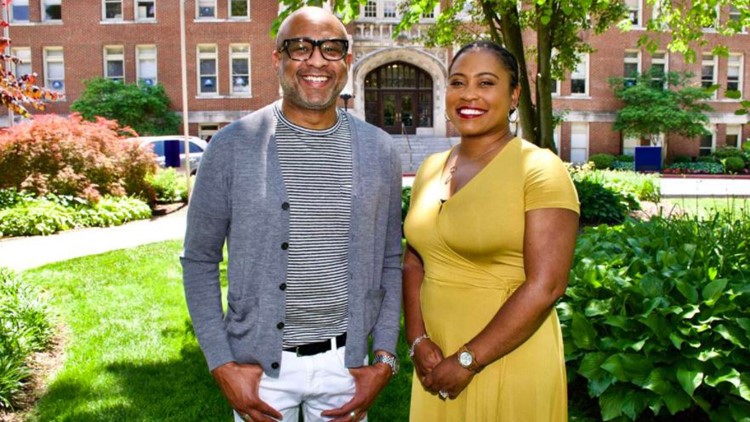Sometimes, out of chaos comes creativity.
Such is the case for two Webster University professors, Vincent C. Flewellen and Marshaun Warren. The professors have launched an eight-week online course for K-12 educators, called “Social Justice and Inclusive Learning.”
Its goal, according to Webster University, is to give teachers the opportunities and tools to meaningfully “address systemic, personal and societal influences that impact culturally proficient instruction.”
The idea for the course, according to co-designers and co-instructors, Flewellen and Warren, came to them after the spread of the Coronavirus and the murder of George Floyd by Minneapolis policemen last year.
“We were thinking in terms of how Webster can show up once again and lead critical conversations that are needed at a time when we’re faced with some serious racial reckoning,” Flewellen explained. “We wanted to figure out what we can do, not only for the internal community at Webster but the entire St. Louis region as well.”
Combined, Warren and Flewellen, have worked in the arena of diversity, equity, and inclusion (DEI) for more than 30 years. Among their various roles in the field, Flewellen serves as chief diversity officer at Webster University and Warren is an adjunct professor and director of Diversity, Equity, and Inclusion for Belleville Township High School District 201.
Both knew that long-term damage to Black youth whose communities were hit especially hard by COVID-19 and police violence needed to be addressed. Also, educators should be better prepared to recognize, understand and tackle the racial trauma that disproportionately impacts students of color.
When designing the program, no one could definitively predict when the COVID-19 pandemic would end. Therefore, their priority was to craft an online course that enabled educators to be safe, while learning the tools and responses needed to address issues of diversity and inclusion in the classroom.
The three-credit-hour, eight-week course, is designed for educators seeking their undergraduate or graduate degrees.
“We ask the students (teachers) to tap into themselves first,” Warren explained.
“They need to understand their own cultural biography before they aim to understand the cultural situations or make-up of their classes. We ask them to do their own cultural reflections first.
“It’s an inside/out approach; If you don’t do this work first then you can’t be effective in facilitating a welcoming respectful environment for students.”
Activities are designed to “push reflection and guide teachers to be better prepared to facilitate conversations,” Flewellen added.
“We didn’t necessarily set out to have a toolkit of what to say or what to do. We want teachers to have an open heart and open mind when they’re approaching students to help them see diversity as an asset and not a deficit.”
The professors note that “diversity, inclusion and equity” have been industry buzzwords in recent years.
Several organizations, businesses, schools and universities have hired “diversity officers” to help navigate the complex world of equity and inclusion. It’s a positive step, Flewellen stressed, but not enough to meet the damaging and fluctuating racial challenges teachers face in today’s classrooms:
“Some organizations hire people of color simply because they’re people of color,” Flewellen said.
“I’ve been doing this work for 20 years and it’s not just because I’m a Black, gay man that I’m able to check the ‘I’m able to do this’ box. My partner is responsible for human resources and DEI training for school districts. Professor Warren and I are educators. We’ve been in this lane for years working within educational settings not in corporate spaces; two entirely different lanes.”
The professors emphasize that the course was not just designed for white educators who teach students of color.
“Black educators have to deal with the trauma of race, too,” Warren explained. “So, to have to teach it can be burdensome to some.”
“We all have ‘stuff,’ even Black folk,” Flewellen added.
“Internalized racism is so deep and so systemic that it even impacts the way black folk view black and other people of color. We are part of a larger society that’s fed the same messages that our white peers are fed and sometimes it may seep into our inner, deepest thoughts and we are unaware of how or when they may play out.”
Ironically, the online course has been introduced in a chaotic political and social environment. There’s widespread pushback against the idea that racism is a social construct embedded in legal, business and educational systems and policies. This hotly debated hypothesis has been loosely defined as “critical race theory” and legislatures, mostly conservative, are drafting bills seeking to ban its use in classrooms.
“This only further underscores the need for these conversations,” Flewellen countered. “This type of thinking emphasizes the need for roles like mine across the board of institutions, particularly academic institutions.”
Although the course was designed to be implemented in a world impacted by the coronavirus, Warren and Flewellen believe it will be relevant and useful in a post-COVID world as well.
“Even when this global pandemic ends, one thing we know for sure is that the other pandemic is not going away anytime soon,” Flewellen said.
“The need for this course is obviously more important than ever. It’s being offered at a time when everybody wants to figure out what they can do.
“We’re simply telling educators you can become more culturally proficient in your delivery of instructions by enrolling in this course.”


